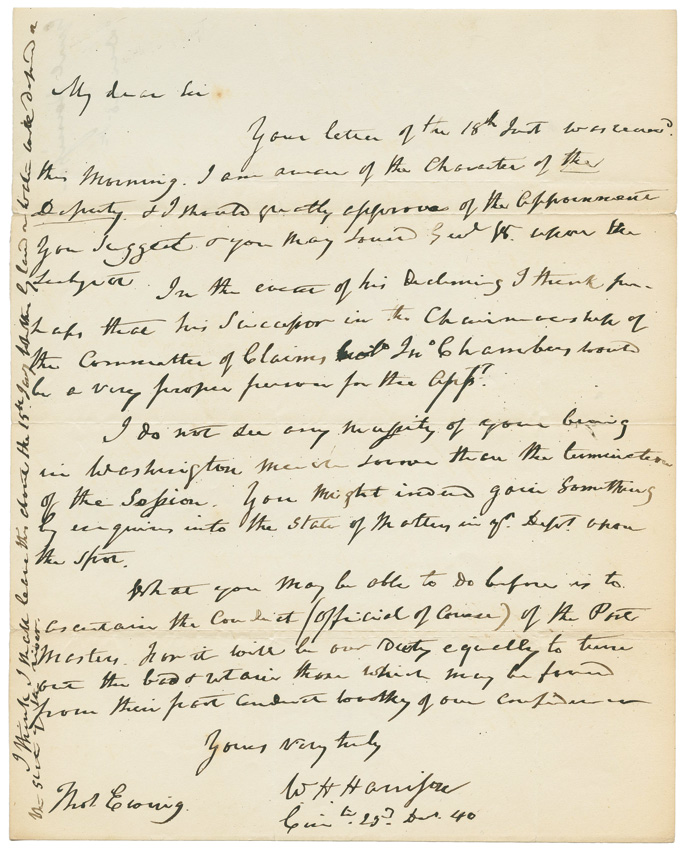
William Henry HARRISON (1773 – 1841) Rare and fine content Autograph Letter Signed “W. H. Harrison” as President-elect, 1p. 9 1/2 x 7 3/4 in. (245 x 195 mm.), Cincinnati, 23 Dec. 1840 to his future Secretary of the Treasury Thomas Ewing (1789 – 1871).
Harrison considers federal appointments as President Elect and announces his plans to travel to Washington. Ten weeks before he would begin his short-lived administration, Harrison works over the details of various appointments with his future Secretary of the Treasury, Thomas Ewing: “… I am aware of the Character of the Deputy & I should greatly approve of the Appointment you suggest & you may sound Genl W. upon the Subject. In the case of his Declining I think perhaps that his Successor in the Chairmanship of the Committee of Claims J[oh]n Chambers would be a very proper person for the App[pointmen]t.” We are unsure as to the identity of “Genl W.”, but Harrison may have been slyly referring to Daniel Webster, Harrison’s nominee for the State Department and a significant influence on his appointments. John Chambers (1780 – 1852) served as aide-de-camp to Harrison during the War of 1812 and was with him at the Battle of the Thames. Chambers served in the House of Representatives from 1828 to 1839 and from 1835 chaired the House Committee on Claims. He, together with Charles Scott Todd accompanied Harrison on his journey to Washington and assisted the President-elect in handling the flood of requests for offices, favors, loans and the like. In thanks for his efforts, Harrison appointed Chambers as Governor of the Iowa Territory, a post he held until 1845.
As for Ewing’s need to be present in Washington before the new year, Harrison did “not see any necessity of your being in Washington much sooner than the termination of the Session [3 March 1841].” When Harrison asked Ewing to join his cabinet earlier in the months, he offered the Ohio politician the position of Postmaster General. On 1st December Harrison had offered Daniel Webster the choice of State or Treasury, but had not yet received a reply. Still assuming Ewing as his future Postmaster General, Harrison advised Ewing on advance work he could accomplish prior to his arrival in the capital: “You might indeed gain something by enquries into the State of Matters in yr Dept. upon the spot.What you may be able to do before is to ascertain the Conduct (official of Course) of the Post Masters. For it will be our duty equally to turn out the bad & retain those which may be found from their past conduct worthy of our confidence.” Harrison was the first President to oversee a power transition from one part to another following Andrew Jackson’s warm embrace of the “Spoils System” of rewarding loyal political supporters with lucrative offices. In his 1841 inaugural Harrison inveighed against the abuse of patronage: “By making the President the sole distributer of all the patronage of the Gov- ernment the framers of the Constitution do not appear to have anticipated at how short a period it would become a formidable instrument to control the free operations of the State governments … But it is not by the extent of its patronage alone that the executive department has become dangerous, but by the use which it appears may be made of the appointing power to bring under its control the whole revenues of the country.” Despite these pledges, Harrison quickly found himself embroiled in the desires of his Whig party to turn out Democratic appointees in favor of more politically reliable men perpetuating a system that would remain in place until the civil service reforms of the late nineteenth and early twentieth centuries.
In the margin, Harrison adds a short postscript,“I think I shall leave here[?] about the 15th Jany”, and adding “Whether by land or by water will depend on the state of the river.” Harrison arrived in Baltimore on 7 February and two days later arrived in Washington to the delight of a large crowd of well-wishers. Harrison spent several days at Gadsby’s Hotel before removing to Virginia to visit with relatives and rest prior to the inauguration on 4 March. His one-month presidency was not caused by his lengthy inaugural address delivered on a cold and damp morning, but rather the press of office seekers and endless functions sapped his energy so that he developed pneumonia and died on 4 April.
Thomas Ewing (1789 – 1871) was a prominent Ohio Whig. He served in the Senate form 1831 to 1837 and again form 1850 to 1851. Ewing was one of the major political supporters of Harrison in Ohio and was partly responsible for securing that state for the Whigs in 1840. After Harrison died, he continued on for a short time in Tyler’s Administration only to resign along with the majority of the cabinet over Tyler’s veto of the third Bank of the United States. Ewing also served as Secretary of the Interior in the administrations of Zachary Taylor and Millard Fillmore.
Extremely rare. Harrison documents and letters signed during his one month tenure as President are virtually unobtainable. Material signed as President-elect are nearly as rare. Only three autograph letters written by Harrison between his election and inauguration have sold at auction in the past sixty years.
Slightly weak at horizontal folds, extremely light toning, else fine condition.
(EXA 3870)
SOLD
